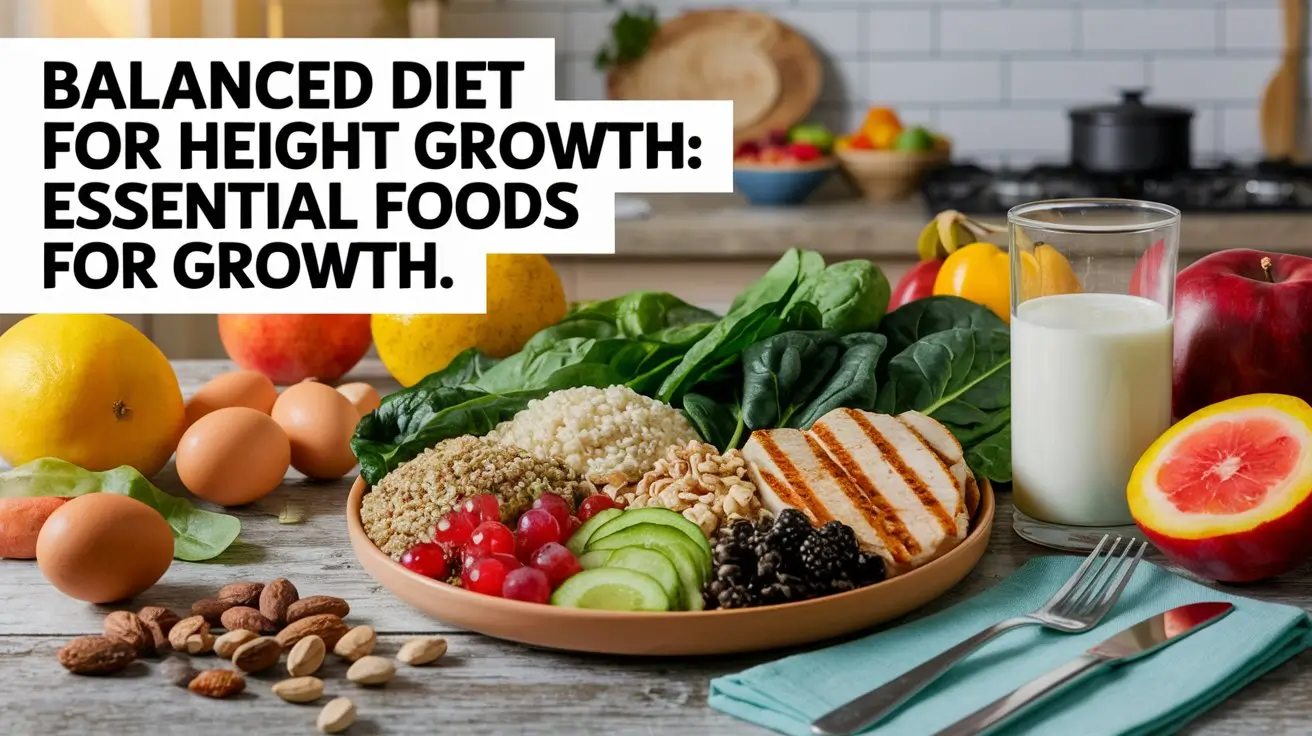Want to reach your greatest height? A balanced diet can help with growth! Research shows that nutrition is crucial for growth, especially in childhood and adolescence. Genetics mainly decides your height, but good nutrition helps support growth.
I will guide you on the key nutrients for bone health and height. These include protein, calcium, vitamin D, and zinc. Experts say a balanced diet with key nutrients can help you grow to your full potential.
In this guide, we’ll look at science-based diet tips, the best foods for growth, and habits for good health.
Exploring how your diet influences height development.
Exploring ways to grow taller? It’s key to know how diet affects height growth. A good diet plan for maximizing growth potential can really help. Your body needs key nutrients to grow taller. These include protein, calcium, and vitamin D for healthy growth.
Choosing the right foods to promote height growth is important. Eating lots of fruits, vegetables, whole grains, and lean proteins is best. These foods give your body what it needs to grow.
Let’s look at what makes a diet good for growth. Important parts include:
-
A balanced diet should have protein, healthy fats, and complex carbohydrates.
-
Enough calcium and vitamin D.
-
Eating whole, nutrient-rich foods.
By eating well and choosing foods to promote height growth, you support your growth. A good diet plan for maximizing growth potential is just part of the equation. Add regular exercise and a healthy lifestyle to reach your full height.
Essential nutrients that promote height growth.
Eating foods high in protein, calcium, and vitamin D can help you grow taller. These nutrients are important for your growth and bone health. These nutrients play a significant role in promoting healthy bone development and growth. Add height-boosting foods to your diet. They provide your body with the building blocks it needs for optimal growth.
A good diet with a mix of whole foods provides the nutrients essential for height growth. Some examples of height growth-boosting foods include:
-
Leafy greens like broccoli and kale, which are rich in calcium, are beneficial to health.
-
Fatty fish like salmon, which is high in vitamin D
-
Lean proteins like chicken and turkey are rich in protein.
Also, follow height-boosting diet tips. Stay hydrated, limit processed foods, and exercise regularly. A balanced diet and a healthy lifestyle can boost your health. They also help support growth and development.
Focusing on key nutrients and height-boosting diet tips helps your body grow. This way, you can reach your full height potential. It’s always a good idea to check with a doctor or dietitian for personalized nutrition advice.
Protein-Rich Foods for Optimal Growth and Development
When you’re looking to grow taller, adding protein-rich foods to your diet is key. Protein is essential for growth and development. It’s important to eat enough of it to help you grow taller.
You can find protein in many foods, both animal and plant-based. A balanced diet with a variety of these can support your growth. For instance, lean meats like chicken and fish are good. Also, plant-based options like beans and lentils are great choices.
Experts say you should eat about 0.8-1 gram of protein for every pound of your body weight each day. Adding these protein-rich foods to your diet can boost your health. It also helps with increasing your height.
The Role of Calcium and Vitamin D in Height Development
When you’re looking to grow taller, knowing about calcium and vitamin D is key. These nutrients are essential for strong bones. They play a big role in how tall you can grow.
Calcium helps build bones, and vitamin D makes it easier for your body to use calcium. You can find calcium in dairy, leafy greens, and plant-based milk. Vitamin D is in fatty fish, egg yolks, and some foods that are fortified.
To grow well, teens need 1,300 mg of calcium and 600 IU of vitamin D every day. You can get this from a variety of foods. Here are some:
-
Dairy products, like milk, cheese, and yogurt.
-
Leafy greens, like broccoli, kale, and spinach.
-
Fortified plant-based milk and cereals.
-
Fatty fish, like salmon and mackerel, is a healthy option.
Eating these foods can help you stay healthy and support bone growth. It’s all about a balanced diet for the best growth.
Creating a balanced diet for height growth.
To support your growth, it’s key to eat a variety of foods to promote height growth. Eat foods high in protein, calcium, and vitamin D. A balanced diet gives your body the nutrients it needs to grow taller.
Start your day with a nutritious breakfast. Try a bowl of oatmeal with fruit and nuts or scrambled eggs with whole-grain toast for a nutritious meal.
For lunch and dinner, choose lean proteins like chicken, fish, and beans. Add more veggies and whole grains to your plate for better nutrition. Healthy snacks, like carrot sticks with hummus or almonds, can help between meals.
-
Grilled chicken with roasted vegetables and quinoa.
-
Enjoy a bowl of lentil soup with whole-grain bread and a fresh salad.
-
Baked salmon with sweet potato and steamed broccoli is a tasty and healthy meal.
These meals mix protein, healthy fats, and complex carbs. They’re key for growth and development. By adding these foods (to promote height growth) to your diet, you support your health and growth.
Growth-boosting supplements and natural alternatives.
Looking into supplements or natural options to boost your height? A balanced diet rich in height growth-boosting foods is key. Supplements can help, but it’s important to use them safely to avoid harm.
The best diet for maximizing height potential should have lots of nutrients. This includes lean proteins, whole grains, and fruits and veggies. Natural options like ashwagandha and ginseng can also support growth. They’re good for your health and might help with height.
-
Talk to a healthcare professional before taking any supplements.
-
Choose supplements from trusted brands.
-
Stick to the recommended amounts and instructions.
By eating well and using safe supplements, you can boost your health and height. Focus on the best diet for maximizing height potential. Also, natural options like ashwagandha and ginseng should be considered for growth support.
Common diet mistakes that may hinder growth.
It’s key to know about diet mistakes that can slow your growth. A balanced diet is vital for reaching your height potential. Not getting enough vitamins and minerals is a big mistake.
Consuming too much sugar and processed foods is another error. These foods can upset your dietary balance. It’s important to eat foods rich in essential nutrients. This means focusing on whole, nutrient-dense foods.
To steer clear of these mistakes, plan your meals well. Make sure you get the right nutrients for height growth.
Here are some tips to help you avoid common diet mistakes:
-
Eat a variety of whole foods, such as fruits, vegetables, whole grains, and lean proteins.
-
Avoid sugary and processed foods that can lead to an imbalanced diet.
-
Stay hydrated by drinking plenty of water throughout the day.
By following these tips and focusing on a balanced diet, you can get the nutrients you need. Remember, a good diet is part of the equation. Regular exercise and a healthy lifestyle are key to reaching your full potential.
Meal Timing and Portion Control for Greatest Growth

To grow to your full potential, focus on a diet rich in foods that help heighten growth. A good meal plan with the right portion sizes is key. It’s important to eat at regular times to keep your body fueled.
Eating three main meals and two to three snacks between is a good strategy. This keeps your energy levels steady, supporting growth. Include foods like lean proteins, whole grains, and fruits and vegetables in your diet.
Part Sizes by Age Group
Part sizes change with age. Knowing the right serving sizes is crucial for getting enough nutrients. Here are some guidelines:
-
Children under 12 years: 1 to 2 cups of food per meal.
-
Teenagers: 2-3 cups of food per meal.
-
Adults: 3 to 4 cups of food per meal.
A balanced diet, exercise, and a healthy lifestyle are essential for growth. Eating foods that support growth and sticking to a meal plan will help you achieve your goals.
Combining proper nutrition with physical activity.
To support your height growth, it’s key to mix a balanced diet with regular exercise. Adding height-increasing diet tips to your daily life can help your body grow. A diet rich in foods that boost height growth gives your body the nutrients it needs.
Regular exercise is also vital for growth and health. Activities like swimming, cycling, or running can boost growth hormones. This hormone is crucial for bone growth and development. A diet and exercise combo supports your health and well-being.
-
Stretching exercises to improve flexibility and balance.
-
Strength training can help build strong muscles and bones.
-
Aerobic exercises improve cardiovascular health and boost growth hormone production.
Add these exercises to your routine. Follow diet tips, and you’ll support your body’s growth. Always talk to a healthcare professional before starting new diets or exercises.
Conclusion: Your Path to Reaching Your Height Potential
A balanced diet is key to reaching your height potential. Eating foods rich in protein, calcium, and vitamin D helps your body grow. Combining good nutrition with regular exercise is the best way to grow taller.
Now you know how to eat for height growth. Start by checking your diet and making small, lasting changes. With dedication and a balanced diet for height growth, you can reach your greatest height. Live your life to the fullest.
FAQ
What are the key nutrients that promote height growth?
To help with height growth, eat protein, calcium, and vitamin D. Protein builds and repairs tissues. Calcium and vitamin D are vital for strong bones.
How much protein do I need for optimal height growth?
Protein needs vary by age for height growth. Kids and teens need 0.85 to 1.2 grams of protein per kilogram of body weight. Great protein sources include lean meats, fish, eggs, and dairy. Also, beans, lentils, and soy are good options.
What are the best calcium-rich foods for height development?
Dairy products like milk, yogurt, and cheese are great sources of calcium. Leafy greens, tofu, almonds, and fortified foods are also good. Aim for 1,000-1,300 mg of calcium daily for strong bones.
How does vitamin D support height growth?
Vitamin D plays a key role in helping your body absorb calcium for strong bones. This is key for height growth. You can get vitamin D from foods like fatty fish, egg yolks, and fortified products. Sunlight also boosts vitamin D production.
What are some examples of a balanced diet for height growth?
A balanced diet has lean proteins, dairy, fruits, veggies, whole grains, and healthy fats. Try oatmeal with berries and almonds for breakfast. Lunch could be a salad with chicken, avocado, and quinoa. Dinner might be salmon, sweet potatoes, and broccoli.
Can supplements help boost height growth?
Supplements can help in some cases, but talk to a healthcare professional first. They can check for nutrient deficiencies. Focus on a balanced diet for height growth.
How does physical activity affect height growth?
Physical activity, like strength training and sports, helps with height growth. It stimulates bone development. But a balanced diet and avoiding too much exercise are also key.
What are some common diet mistakes that can hinder height growth?
Diet mistakes include not eating enough calories or protein, skipping meals, and eating processed foods. Avoid restrictive diets and fasting, as they can harm growth.
